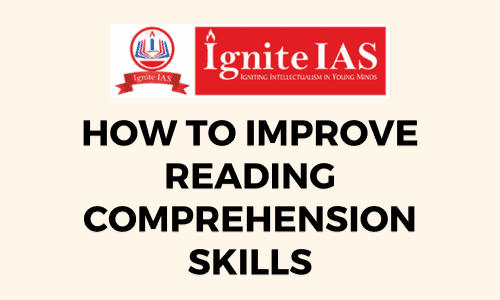Introduction
Reading comprehension is a vital skill for IAS (Indian Administrative Service) aspirants. The IAS examination demands a deep understanding of complex texts, which requires excellent reading comprehension abilities. In this article, we will explore effective strategies and techniques to enhance reading comprehension skills for IAS aspirants.
1. Understand the Purpose
Establishing the Purpose of Reading
Before diving into any text, it’s crucial to identify the purpose of reading. Whether it’s for research, analysis, or general understanding, having a clear objective helps focus the mind and extract relevant information effectively.
2. Pre-Reading Techniques
Scanning and Skimming
Practicing scanning and skimming can significantly boost comprehension. Scanning allows you to quickly find specific information, while skimming provides an overview of the text’s main ideas and structure.
Previewing
Previewing the headings, subheadings, and bolded or italicized text before delving into the content offers a sense of what to expect and prepares the mind for better assimilation.
3. Active Reading
Annotating
Taking notes and underlining key points while reading keeps the mind actively engaged and aids in retaining information. Write down questions or insights to revisit later.
Summarizing
After reading each section or chapter, summarize the main points in your own words. This practice reinforces understanding and aids in long-term retention.
Making Connections
Relating the new information to existing knowledge or personal experiences helps in forming meaningful connections, making the content more memorable.
4. Vocabulary Development
Context Clues
When encountering unfamiliar words, use the context to infer their meanings. Understanding the surrounding words and phrases often provides clues to the word’s definition.
Creating Vocabulary Lists
Maintain a vocabulary list and review it regularly. Include words encountered during your reading, and make a conscious effort to incorporate them into your writing and speech.
5. Time Management
Practice with Timed Readings
IAS exams have strict time constraints. Practice reading passages within specific time limits to improve both speed and comprehension.
Prioritize Important Information
Identify the core ideas and focus on understanding them thoroughly. Avoid getting bogged down by less critical details during the initial reading.
6. Critical Thinking and Inference
Questioning the Text
Ask yourself critical questions while reading. Analyze the author’s arguments, evidence, and perspectives to develop a deeper understanding.
Drawing Inferences
Learn to infer information not explicitly stated in the text. This skill is valuable for comprehending complex passages and forming educated opinions.
7. Engage in Discussions
Join Study Groups
Participating in study groups or book clubs can provide different perspectives and interpretations of the same text, leading to enriched comprehension.
Debates and Debunking
Engaging in debates and discussions forces you to critically analyze the text and defend your interpretations, strengthening your comprehension skills.
Conclusion
Improving reading comprehension skills is an essential aspect of IAS preparation. By understanding the purpose, utilizing pre-reading techniques, actively reading, building vocabulary, managing time effectively, and engaging in discussions, IAS aspirants can enhance their comprehension abilities and perform better in the examination.
FAQs
- Q: How long does it take to improve reading comprehension skills?
A: The time required varies from person to person, but consistent practice can yield noticeable improvements in a few weeks. - Q: Can fiction reading also help in IAS exam preparation?
A: Yes, reading fiction can enhance critical thinking and analytical skills, which are valuable for the IAS examination. - Q: Is speed reading helpful for IAS aspirants?
A: Speed reading can be beneficial, but not at the cost of comprehension. Balance both speed and understanding. - Q: How can I stay focused while reading lengthy texts?
A: Taking short breaks, using annotation techniques, and setting specific reading goals can help maintain focus. - Q: Are audiobooks a good alternative for reading practice?
A: Audiobooks can be helpful for auditory learners but may not be as effective as traditional reading for comprehension improvement.




